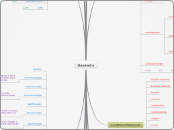Geometry
Parallelograms
Opposite Sides
Opposite Angles
Consecutive Angles
Opp. Sides ~=
Diagonals bisect Opp
Consecutive angles supp.
Transformations
rotations
translation made of 2 reflections
center of a regular polygon
translational symmetry
angle rotation
symmetry
reflectional symmetry
line symmetry
point symmetry
reflections
line of reflection
point/line/rotation/reflectional symmetry
isometry
tessellation
pre-images
scale factor translations
dialation
enlargement
reduction
center
scale factor
There are only 4 isometry
A translation or rotation is a compostion of two reflections
Polygons (regular)
isoscles trapezoid
2 sides that are congruent and a pair of angles that are congruent
oppostie sides
midsegment of a trapezoid
trapezoid
exactly 1 pair of parallel sides (bases)
base
regular polygon
kite
quadrilateral with 2 pairs of consecutive sides congruent and no opposite sides are congruent
opposite angle
coordinate proof
rectangle
leg of a trapezoid
square
base angle
equilateral/equiangular
polygon
parrallelogram
rhombus
diagonals bisect
4 congruent sides
diagonals are perpendicular
square
4 congruent sides
4 right angles
rectangle
4 right angles
diagonals are congruent
consecutive angles
6-11
6-5
6-3
6-4
6-22
6-15
6-7
6-12
6-13
6-8
6-21
Conditional Statements
inductive reasoning
deductive reasoning
theorem
converse
contrapositive
counterexample
negation
inverse
conditional
biconditional
law if detachment
law of syllogism
p-->q
q-->p
~p-->~q
~q-->~p
Angle Measures
Complementary
Vertical
Right
Supplementary
Adjacent
Angles in transversals
~=angles
Angles
skew lines
parallel lines
Alternate Exterior Angles
Corresponding Angles Postulate
Same Side Interior Angles
alternate interior angles are =
Acute
Right
Obtuse
Complementary
Supplementary
Perpendicular Lines form right triangles
M<A + M<B + M<C = 180
Congruency
Vertical angless are congruent
SAS,ASA,AAS,SSS,CPCIP
If 2 angles are supplements/compliments of the same angle (or 2 congruent angles)then the 2 angles are congruent
All right angles are congruent
If a transversal intersects two parallel lines, then corresponding angles are congruent.
If a transversal intersents two parallel lines, then alternate interior and alternate exterior angles are congruent
Trigonometry
sine
opposite___hypotenuse
tangent
opposite____adjacent
cosine
adjacent____hypotenuse
45,45,90=x:x:2x
Area
sector of circle
diameter
congruent arcs
concentric circle
apothem
segment of a circle
central adjacemt arcs
arc length
A=1/2 d1d2
A= 1/2 bh
A=1/2h(b1 +b2)
A=1/2b2(sinA)
C=2(pi)r
C=(pi)d
A=bh
A=1/2ap
The length of an arc of a circle is the product of the ratio measure of arc/360 and the circumference of the circle.
Volume
V-bwh
similar solids have a ratio of a3:b3
cylinders
(pi)r2h
pyramids
1/3bh
spheres
4/3(pi)r3
rectangular prisms
bwh
cones
1/3bh
triangles
isosceles
30-60-90 triangles
In a 30-60-90 triangle the length of the hypotenuse is twice the length of the shorter leg. the length of the longer leg is square root of 3 times the length of the shorter leg.
scalene triangles
45-45-90 triangles
In a 45-45-90 triangle both legs are congruent and the length of the hypotenuse is square root of 2 times the length of the leg
Right triangles
obtuse triangles
If the square of the length of the side of a triangle is greater than the sum of the squares of the lengths of the other two sides, then the triangle is obtuse.
acute triangles
If the square of the length of the longer side of a triangle is greater than the sum of the other two sides then the triangle is acute.
equilateral triangles
volume= 1/3bh
area=1/2bh
Lat. Area=1/2PBl
Surface Area=LA + 2B
AAS
AA~
SSS
SAS
Triangle sum theorem
HL
Pythagorean Theorem- If a triangle is a right triangle, then the sum of the squares of the lengths of the legs is equal to the square of the length of the hypotenuse.
Proofs
paragraph
flow
2 column
Circles
Secants
Chords
arcs
intercepted arc
tangent
point of tangency
tangent to a circle
locus
circumference
radius
diameter
segment lengths --- a*b=c*d
(w+x)w=(y+2)y
(p+q)p=tsquared
circles in the coordinate plane : (x-h) squared + (y-k) squared = r squared
If a line is tangent to a circle, the line is perpendicular to the radius @ the point of tangency.
If a line in plane of a circle is perpendicular to a radius at the endpoint to a circle.
If 2 tangent segments to a circle share a common endpoint outside the circle, then the 2 segments are congruent.
